

Sept/Oct 2025
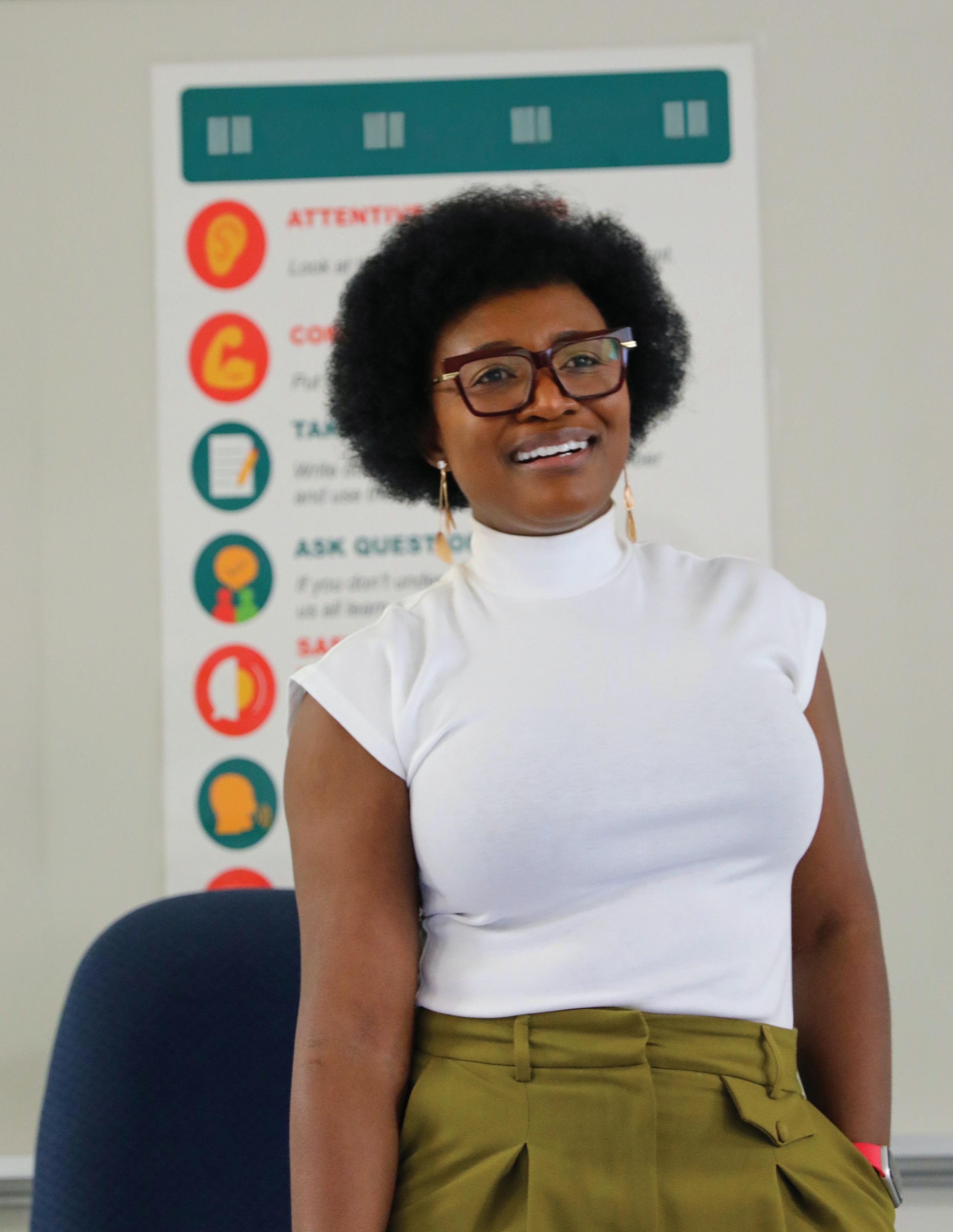
Bethel Middle School teacher Nelago Nuunyango is inspiring students around the globe.




Sept/Oct 2025

Bethel Middle School teacher Nelago Nuunyango is inspiring students around the globe.

In 2019, our voters approved a School Construction Bond to build new schools and renovate and expand old ones. Bond funding is kept separate from the rest of the district’s budget, including our levies that need to be renewed every four years. As the saying goes: Bonds are for Building, Levies are for Learning. Learn more at bethelsd.org/bond
The much needed expansion of Evergreen Elementary is complete and welcomed students on the first day of school! The bond-funded project added 10,000 square feet to the school, which included 10 additional classrooms, a new commons area, and a fully renovated special education suite.
“We are so thankful for the support of our community and voters,” said Evergreen Principal Lisa Whitmire. “Our new school is really going to
reflect the pride and purpose that our community and our staff and students have in our school.”
What will happen to the old Naches Trail Elementary?
Evergreen students and staff spent the past year in the old Naches Trail building while the Evergreen remodel took place. The old Naches Trail is now being evaluated for future use. Ideas under consideration include office space, training areas, and/or a community center. Since the district utilized state matching funds to build the new Naches Trail, due to state law, the old building can’t be used as a permanent school site. As there was money in the bond to tear down the old Naches Trail, that money would be used instead for any construction/ remodeling projects at the site.
At almost 300,000 square feet, the New Bethel High School is a massive
Completed projects funded by the 2019 School
Construction Bond
• Challenger High School Phase II Expansion
• Evergreen Elementary Remodel & Expansion
• Expedition Elementary
• Graham-Kapowsin High School Expansion
• Katherine G. Johnson Elementary
• New Naches Trail Elementary
• Turf fields at Graham-Kapowsin and Spanaway Lake high schools
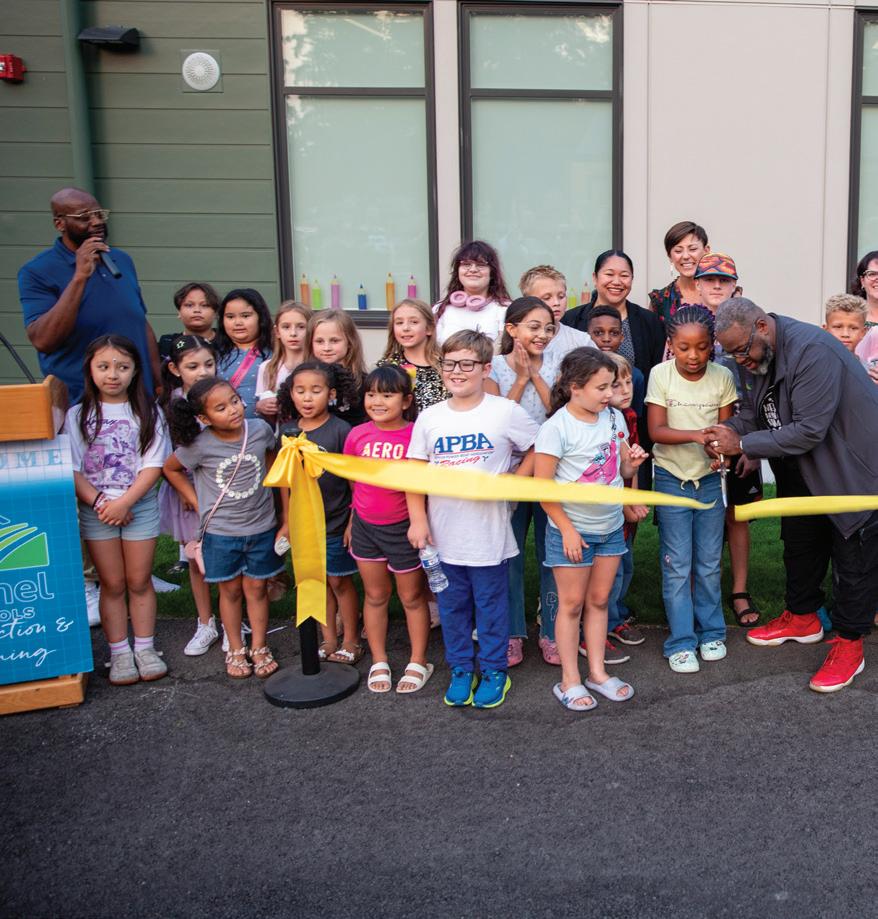
project. Exterior brickwork is going up on the building, the student parking lot has been paved, and they are working on finishes in the athletics area, including the gym floor! Construction on the New Bethel High School broke ground in 2024 and is scheduled to be completed in 2026.
Originally planned as a modernization and expansion under the 2019 Bond, careful planning and additional state funding will now allow for a full rebuild of Cedarcrest Middle School.
Built in 1982, Cedarcrest is one of the district’s older schools. At just under 88,000 square feet, it is comparable in size to our modern elementary schools

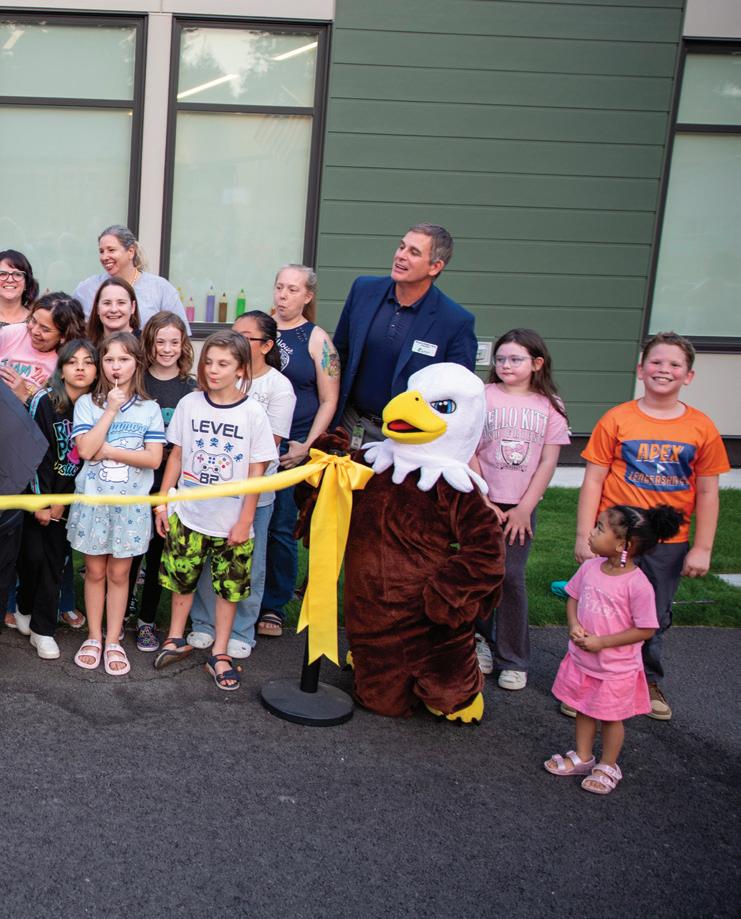
and no longer meets our community’s needs.
The new three-story building will be nearly 123,000 square feet, featuring 39 classrooms and capacity for 850
students, up from the current 700.
Construction is set to begin in summer 2026, coinciding with Bethel High School students moving into their new building. Cedarcrest students will temporarily relocate to the old BHS for two years.
“We’ve been working closely with Principal Hans Nelson,” said Director of Construction and Planning Sara Coccia. “I’ve actually been out to the old high school site several times with him to talk about specific areas of the building that he’d like to use, and areas of the building that he’s not going to use. We’re working with our team to try and make sure that there’s certain areas of the building we can close off so that he is able to better utilize that space for his students.”
The new Cedarcrest is scheduled to open in the fall of 2028.
“I think it’s really going to be something our community can be proud of,” Principal Nelson said.
In 2006, voters approved a bond that built Liberty Middle, Frederickson Elementary, and Nelson Elementary; rebuilt Spanaway Elementary, Clover Creek Elementary, and Shining Mountain Elementary; expanded Spanaway Middle School; modernized Spanaway Lake High School; built our Central Kitchen and Transportation Center; as well as improvements around the district to technology, safety and security, HVAC, roofing, fields, grounds, parking lots, bus loops, septic systems, cafeterias, and more.
In 2001, voters approved a bond that built Graham-Kapowsin High School and Cougar Mountain Middle School, rebuilt Kapowsin Elementary, modernized Thompson Elementary and Spanaway Middle School, acquired sites for future schools, as well as heating/ventilation, safety, roofing and other projects across the district.
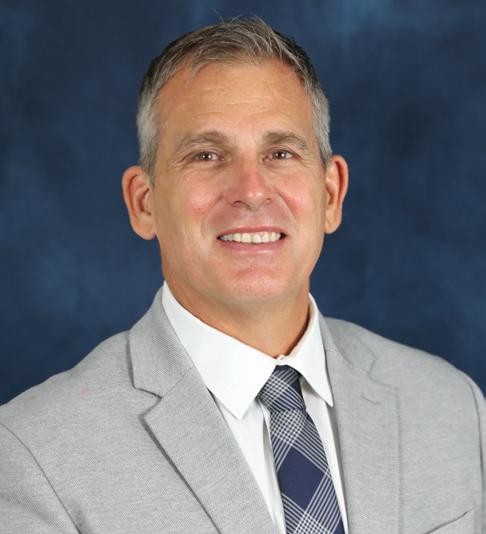
Believe it or not we’re already in the second month of school and I want to take a moment to say thank you. Whether you’re supporting your students at home, supporting students as a staff member, or supporting the district with your taxes, your contributions have made the first month of this school year incredibly positive.
If you receive this magazine in your mailbox, you are one of the many who support our schools with your tax dollars. Thank you! Your support of our Educational Programs and Operations levy funds 11% of our district’s budget. As you’ll see on the next page, the EP&O Levy pays for things the state does not fund or simply underfunds. That levy is up for renewal next year, along with our Technology Capital Levy.
On this page, you can see your bond dollars at work. The newly remodeled and expanded Evergreen Elementary is the model for how we intend to pursue bond projects in the future. Instead of buying land and building new schools, the Evergreen model is an efficient and cost-effective way to do business. I was especially thankful to see so many Evergreen parents and students at the ribbon cutting, celebrating their new school.
Finally, thank you to all of you who showed up at our first Coffee with the Superintendent event. It was great to hear your feedback and connect. I look forward to talking more with you at our next event on October 7.
Brian Lowney, Ph.D. Superintendent

It’s been over a decade since voters initially approved our Technology Capital Levy and put iPads into the hands of students across the district. Since then, the Capital Levy has been renewed every four years by voters to keep our students technologically literate in an ever-changing world.
How were iPads chosen?
Back in 2013, before the Technology Capital Levy went before voters, our Technology team conducted a pilot at two schools, trying out a number of different devices that were under consideration. Chief Technology Officer Mike Christianson said Chromebooks, laptops, and tablets were all given a trial run. “We did extensive pilots and got feedback from all of our users and overwhelmingly the Apple iPad was picked,” he said.
Christianson said one reason was that Apple had the biggest educational ecosystem at the time. He also said the iPads were a good size and easy to use for all students.
So once the Technology Capital Levy was approved by voters in 2014, it was time to buy a few iPads.
About 20,000 of them.
One for each student.
Technology is ever evolving, and that’s why it won’t surprise you to know that the iPads purchased for students in 2014 aren’t still in use here in Bethel. “Those get swapped out all at once, every 3-4 years,” Christianson said.
He said the swap is done by grade, so all grade levels are using the same version of devices.
Swapping in the new devices for the old is a huge undertaking. All of the elementary schools are done at the same time, usually during the summer, which means there are 10,000 new devices coming in, and 10,000 old devices going out.
Dealing with 20,000 ipads all at once is something Christianson’s team has perfected over the years. “Right now we can reset all elementary iPads in three days. It used to take us three days per elementary,” he said.
What happens to the old iPads?
Those old iPads still have a life ahead of them, just not here in Bethel. Christianson’s team works with resellers to get the best value for the old devices. That makes every tax dollar stretch even further.
“We’ve added millions of dollars back into our Tech Levy budget funds to replace devices and keep the overall budget on track,” Christianson said.
But without good infrastructure, those iPads wouldn’t be very useful. The Technology Capital Levy also pays for our internet and wireless (WiFi) systems, our data center and servers, hardware, software, mobile hotspots, and the critically important, internet security.
Alongside that, money

from the Technology Capital Levy also supports some staff positions, including tech support and some of our Teachers on Special Assignment (TOSAs).
Next year, both our Educational Programs and Operations (EP&O)* Levy and our Technology Capital Levy will be up for renewal. These levies are on a four year cycle and are critical funding for our district. Voters have renewed the EP&O Levy every four years for decades, and they’ve renewed the Technology Capital Levy every four years since it was first put before voters in 2014. Pending School Board approval, both of these levies are expected to be on the ballot in 2026.
*The EP&O Levy basically pays for everything the state doesn’t fully fund when it comes to basic education. The state’s funding model has been outdated for some time, and all districts require more money than the state provides to support students. About 98% of our EP&O Levy pays for salaries and benefits for positions the state underfunds.
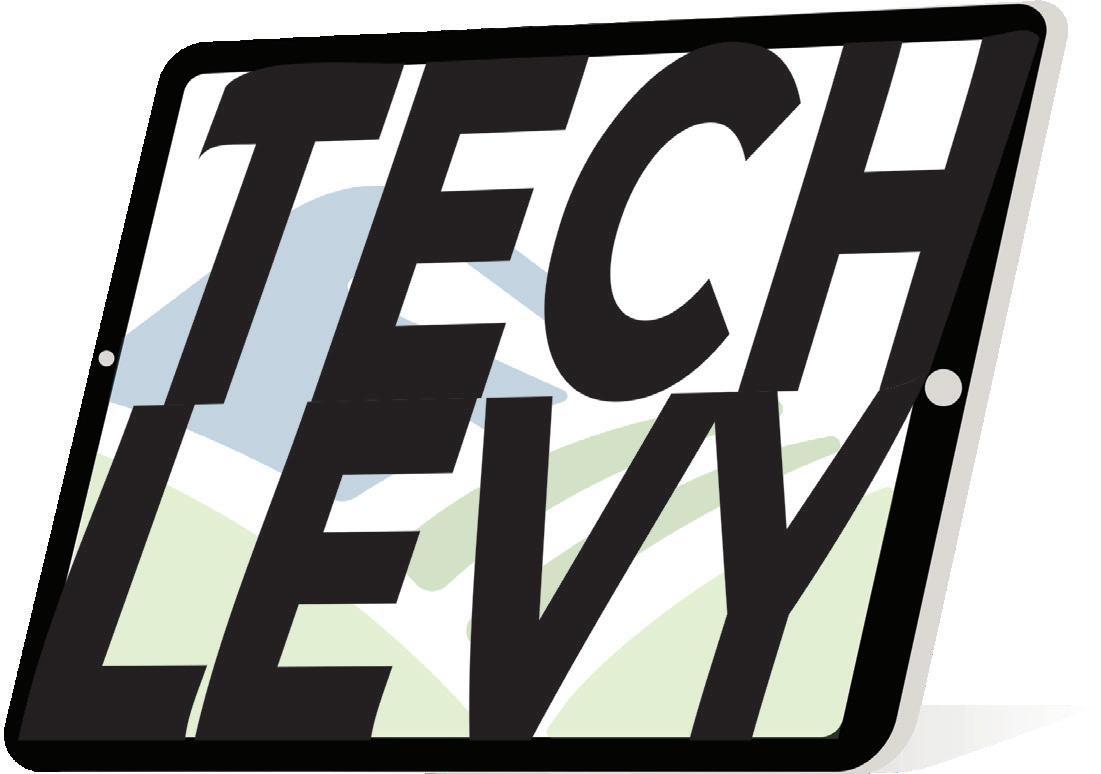
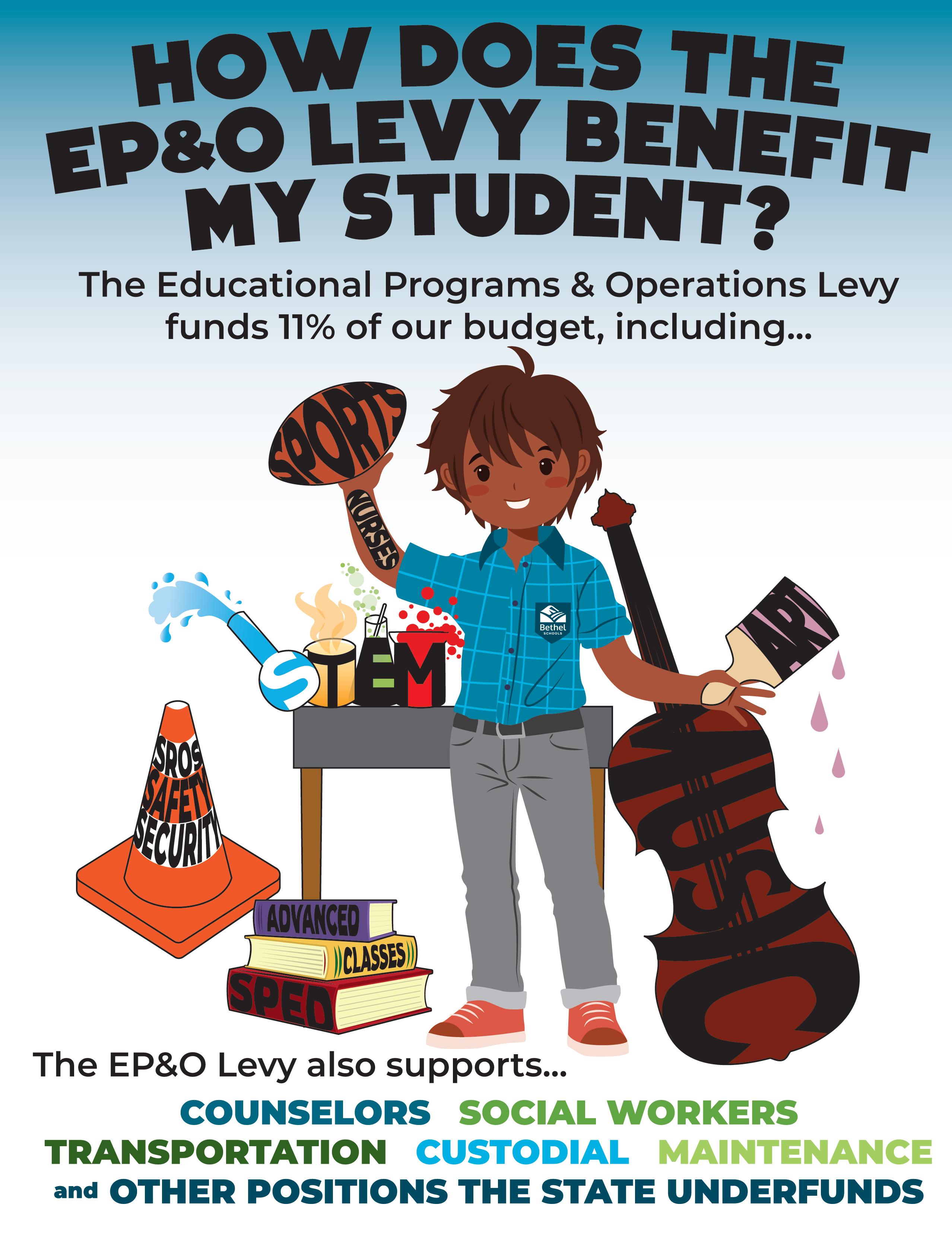

When Bethel Middle School teacher Nelago Nuunyango tells her students that education can change their lives, she speaks from experience.
Nuunyango’s own journey stretches from moonlit study sessions in rural Namibia to the halls at Pacific Lutheran University, and finally to the desks of her students at Bethel Middle.
Growing up in a small Namibian village of farmers, Nuunyango learned early that education required sacrifice. Getting to high school meant walking four to five miles each day, oftentimes in the dark.
“I used to get up at five in the morning, so I could get there when school started at 8:30,” she said. “But I was determined though. Where I’m from, poverty is your motivator. I really didn’t want to live in the village for the rest of my life.”
That determination carried her through long nights of studying without electricity, relying on a fire, or, if she was lucky, a kerosene lamp. She pressed on because she believed education was the key to something more.
After more than three decades in Namibia, Nuunyango moved to America. She enrolled at Green River Community College, then went on to earn both her bachelor’s and master’s degrees at Pacific Lutheran University. Now in her third year teaching English Language Arts and Washington State History at Bethel Middle, she brings her life experiences to her classroom every day.
“I want my students to understand the

reality of life,” she said. “I can use my story and my passion for education inside the classroom.”
Nuunyango sets a tone very early in her classroom. Her expectations are clear and uncompromising.
“I hold them to high expectations, and I don’t accept anything less, because that communicates to them that I see them and I see their abilities,” she said.
Her commitment to education extends well beyond Bethel. Every year, she returns to her home village in Namibia, where she started a foundation that has been running for more than a decade. With money she raises
throughout the year, Nuunyango buys school supplies, backpacks, uniforms, and even groceries for families in her home village.
“There’s a saying in my language that if you do not have calves, then you won’t have cows in the future. And if you do not have seedlings, then you will not have a harvest. The children are the seedlings. The children are the future," she said.
For Nuunyango, that truth applies in every classroom, everywhere.
“Once you have interacted with a student, as a teacher, you have touched the future," she said.

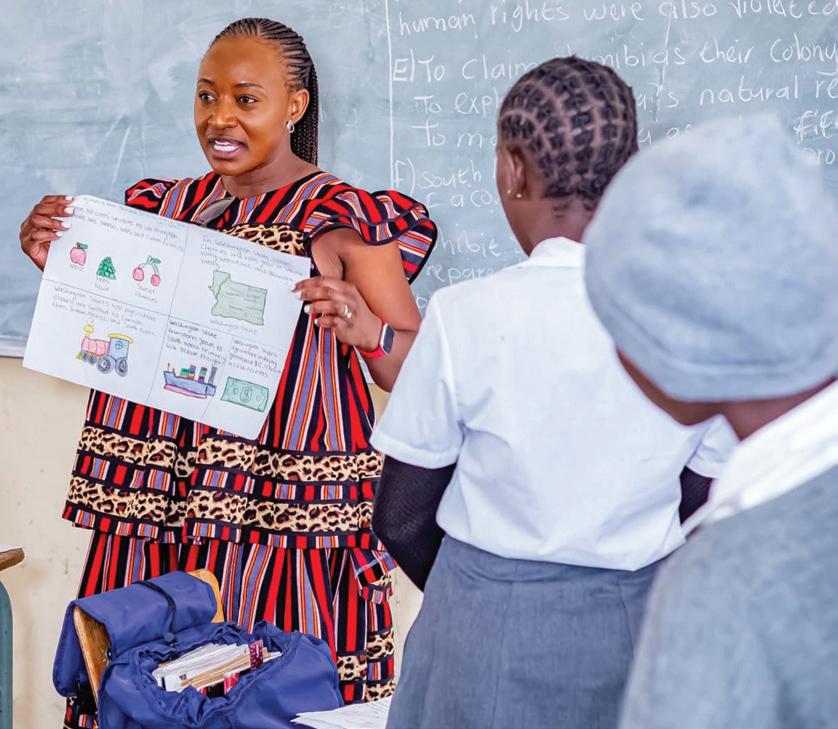
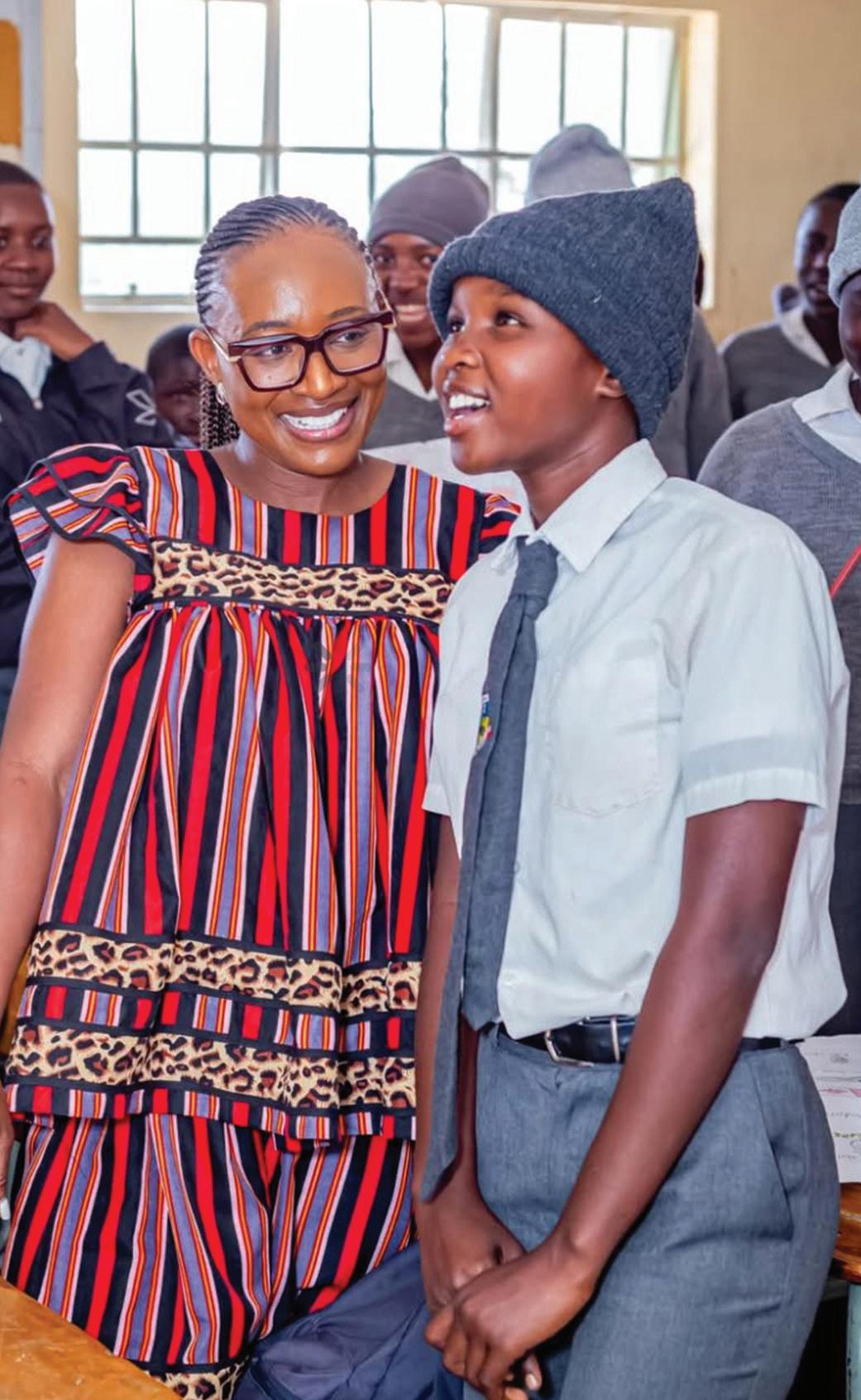

Students, staff and community members gathered at Spanaway Lake High School to honor the lives lost in the September 11 terror attacks 24 years ago.
The ceremony featured a joint color guard from our JROTC programs, as well as a performance by the SLHS Music Company.
Director of Career and College Readiness Jeff Johnson said 9/11 is a date that profoundly changed our nation.
the families whose lives were forever altered.”
In the crowd were veterans and first responders, but the majority were students – who were born after that fateful day.
“For our current students here today it isn’t a memory, it’s history,” Johnson said. “They grew up in a world shaped by its aftermath and they may not fully grasp the emotional weight it carries for many Americans.”
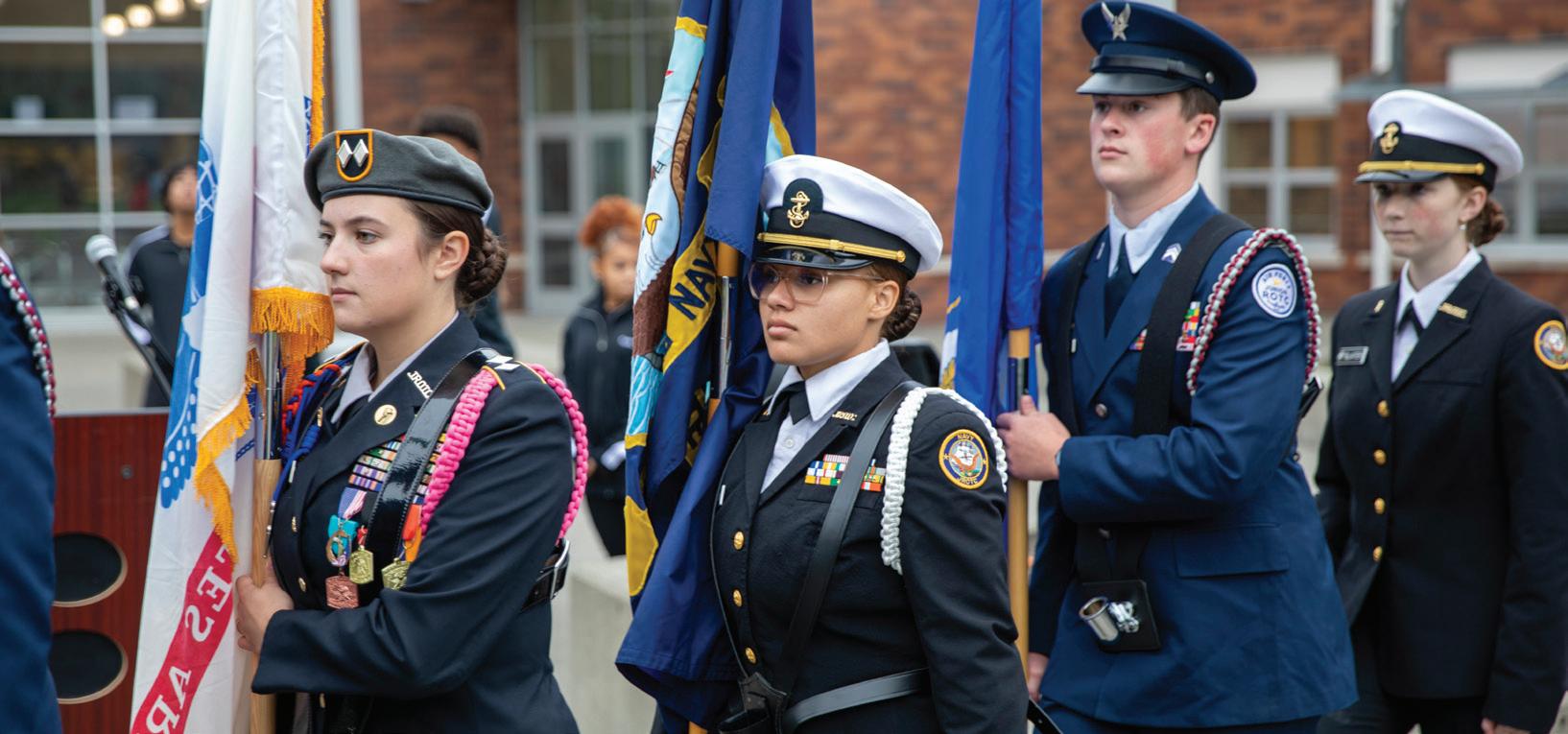
“Those who lived through this event know that the terrorism that marked this day cannot be ignored in our nation,” she said. “It is our civic duty to ensure that we as a generation protect the patriotism of our nation. Whether you join the military or not, we remember this day so that we can prevent it from happening again.” 9/11
“Twenty-four years ago nearly 3,000 lives were lost in a series of coordinated events that struck at the heart of our country,” he said. “Today we remember the innocent victims, people from all walks of life, who were simply just going about their day. We remember the first responders who ran towards danger with courage and selflessness. And we remember
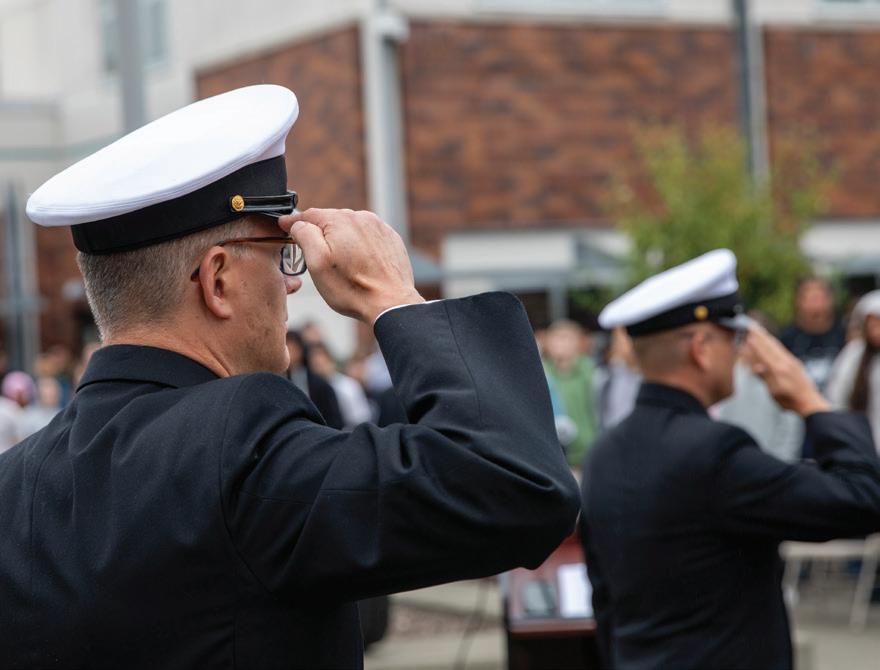
That’s why ceremonies like this one are so important. They create a space to share stories, to honor the lives lost, and to connect generations.
Serenity Gonzalez is a student at SLHS and serves as the Executive Officer of the Navy JROTC Unit. She spoke about her generation’s duty going forward.


An assistant principal at Cedarcrest Middle is seeing the impact of mentorship firsthand as two of his former student-athletes return to school as paraeducators with a mission to give back.
Less than a decade ago, Charles McQueen and Tre Ferguson were teammates at Cedarcrest, coached by Zack Womack. Today, the three are back in the same building, but this time as colleagues.
For McQueen, the path back to Cedarcrest began with a passion for sports. He played at the collegiate level before shifting his focus toward academics and education. That shift led him to rediscover what really mattered: giving back to the community that shaped him.
“This is home for me,” McQueen said. “I just love being able to see that I’ve planted certain seeds inside the minds of our youth, and they take those
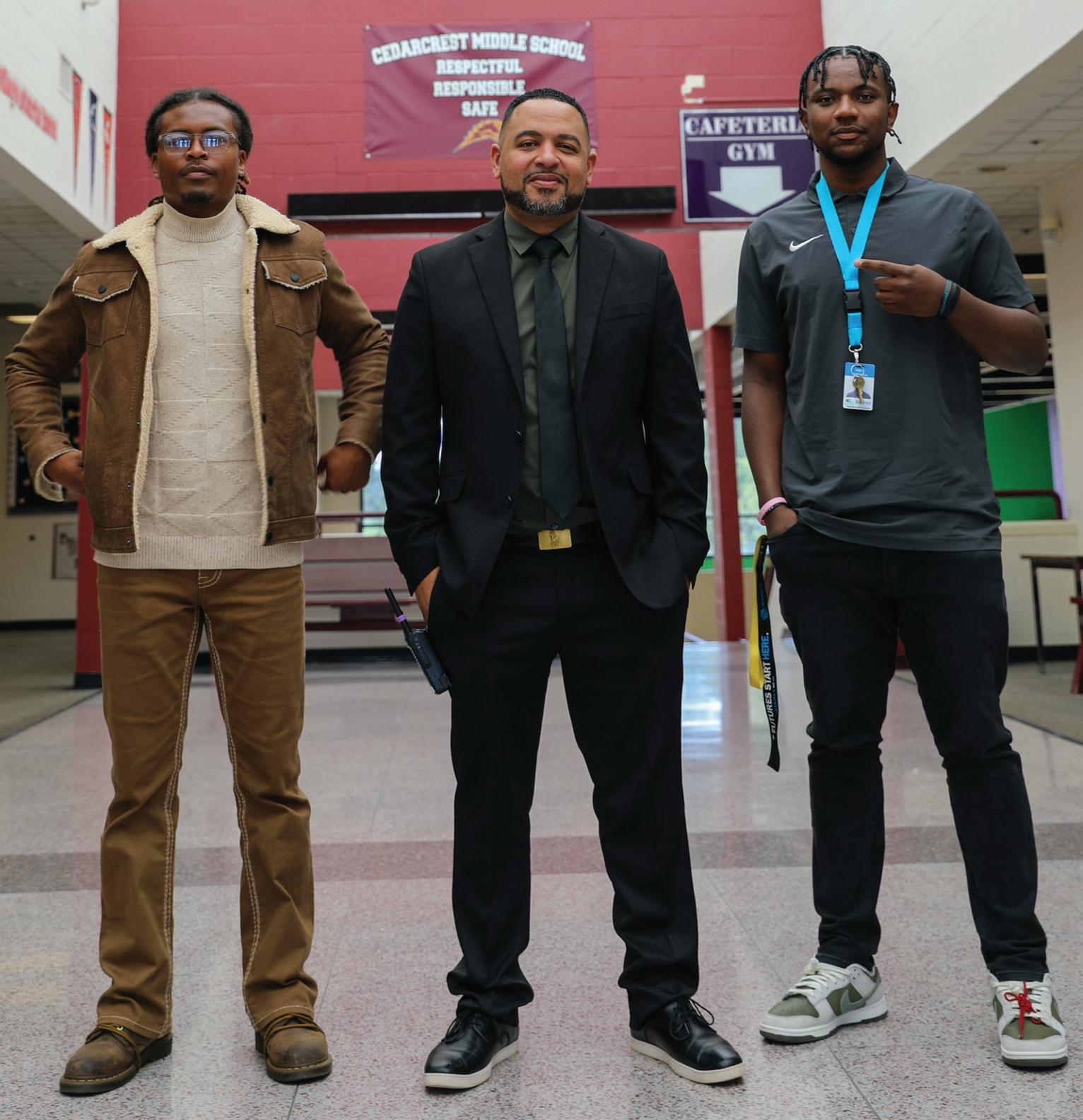

seeds and water them until they grow into trees in high school.”
Ferguson also found clarity through reflection. After spending time in college athletics and coaching, he realized his true calling wasn’t just in sports, but in making a difference in the lives of young people.
“I’m just super grateful to be in a position where I can change these kids’ lives,” Ferguson said. “I’m always motivated to be here. I’m always smiling.”
Their return made an immediate impact. Walk through the halls of Cedarcrest and you’ll see students lighting up around them, sharing high fives, inside jokes, and meaningful conversations, Womack said.
“These guys are making a huge impact in our community,” he added. “They’re really an instrumental part of our growth. For our students to see these young men coming back and giving to our community, it’s been an awesome thing.”
Womack understands the value of that on a personal level. He began his own career as a paraeducator before becoming a teacher and later, an administrator. Now, he’s seeing that same cycle continue in the next generation.
“It’s not all about Xs and Os, and it’s not always about tests,” Womack said. “These two young guys are inspiring the student body.”

Our Transportation Department is moving full speed ahead under the leadership of new director John West and the launch of a high-tech routing software.
West, who has 15 years of experience in transportation and logistics, brings both optimism and energy to his new role. He previously served as Transportation Manager at Federal Way Public Schools, but said it was Bethel’s strong sense of community that drew him here.
“Above all, serving and supporting the district is what brought me to Bethel,” West said. “The community outreach that we bring here is one of the most important aspects of the job, and that’s what I love most about it.”
This year, we rolled out a new routing software designed to make scheduling easier and more efficient for both routers, drivers and students. Like any major change, it will take some time to adjust, but West is confident the improvements will ultimately
strengthen the entire department.
For the district’s 16,000 daily riders, bus drivers are far more than just operators of vehicles. “When I think of a bus driver, they’re not just opening and closing doors and pressing the gas and brake pedals and turning the wheel,” West said. “They are responsible for so much more. They are the first [district employee] these students see every morning and the last person they see in the afternoon, so we really have the ability to set the tone.”
Drivers undergo extensive preparation before taking the wheel. They receive 6-8 weeks of training, including more than 300 hours of paid classroom instruction and on-the-road practice. Training also includes OSPI and Right Response certification to ensure they’re ready for every situation.
“When you think of what role our bus drivers are playing, they are
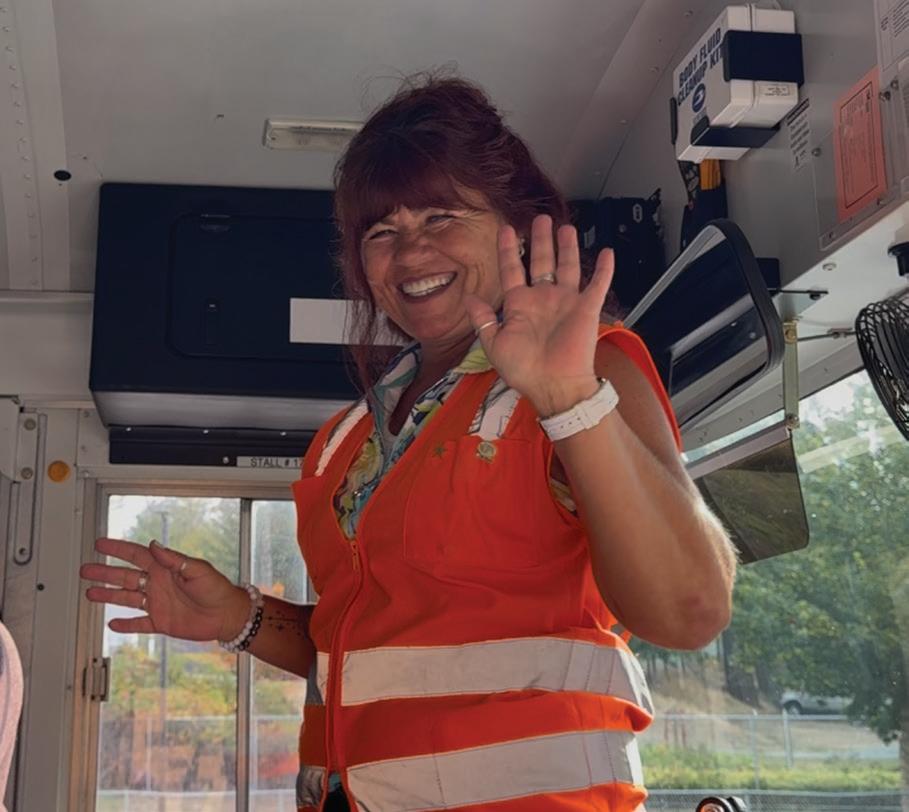
transporting the most precious cargo there is out there – a human being,” West said.
That sense of responsibility is what drives the team forward.
“Families rely on our services at Transportation, and we take that seriously,” West added. “We really take pride in our jobs and pride in our drivers, and all around what we do to get kids to school so they can have the best education possible.”
With more than 21,000 students districtwide and most relying on bus service, we are actively hiring new drivers. We offer paid training, flexible schedules, and the chance to make a meaningful impact every day.
Anyone interested in joining Team Bethel can look forward to more than just a job -- it’s an opportunity to help set the tone for a child’s school day and play a vital role in their education.
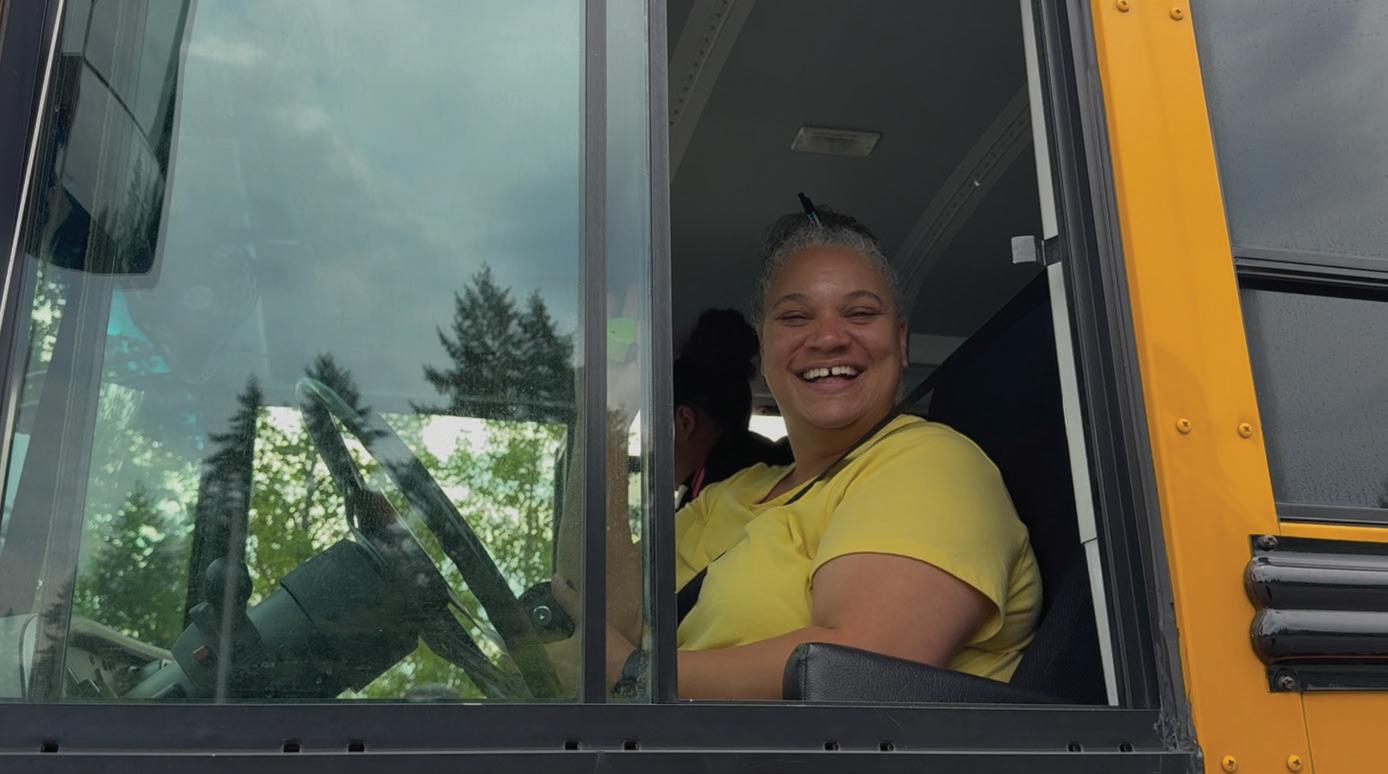

Kapowsin Elementary has been recognized as a 2025 Washington School on the Rise by the Association of Washington School Principals.
The award celebrates schools that center student leadership and voice, something Kapowsin Principal Jennifer Vasilez says is at the heart of their approach.
“I believe deeply, and my staff believe this as well, that our school centers around the children we serve today, and they should have a strong voice then in the school,” Vasilez said. “It increases a sense of belonging, and we see how important a sense of belonging is to schools in the academic outcomes.”
One way Vasilez and her staff prioritize student voice is through monthly meetings with third, fourth, and fifth graders. In these sessions, students share feedback and go over data together. Last year, students expressed that while they appreciated opportunities to speak in class, some felt certain voices were dominating the discussions. Vasilez brought this concern to her staff, who developed a plan to address it. The next round of data showed the issue had improved.
“That story shows a really concrete link between the feedback we’re receiving from our students and the humility and intentionality of my team in meeting those needs,” she said.
In their award letter, AWSP praised Kapowsin as “a model of what is possible when student agency, voice, and leadership are not just

encouraged, but deeply embedded in school culture. Your commitment to making students active participants in shaping their school experience has transformed both your campus climate and academic outcomes.”
The recognition also highlighted initiatives such as Student Voice Lunches, Cougar Crew service projects, Pawsitive Patrol peer mediation, and 5th Grade Legacy Projects. Together, these programs ensure Kapowsin’s students are not just attending school, they're helping to shape it.
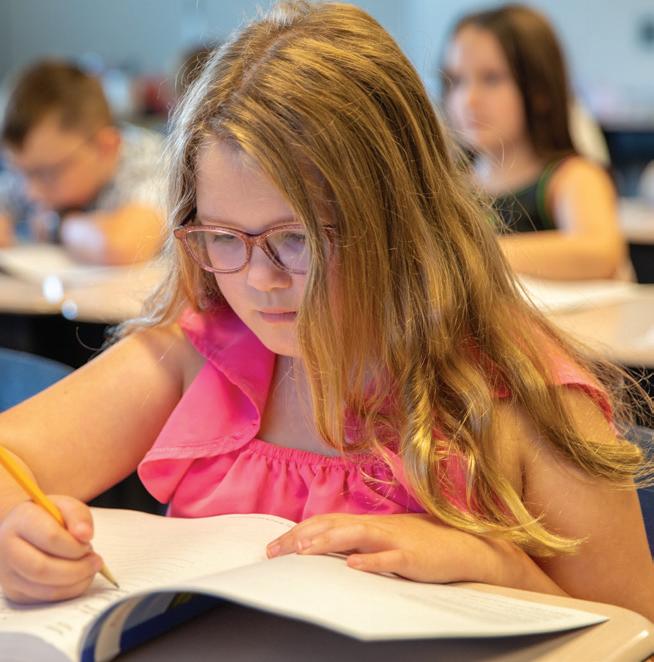
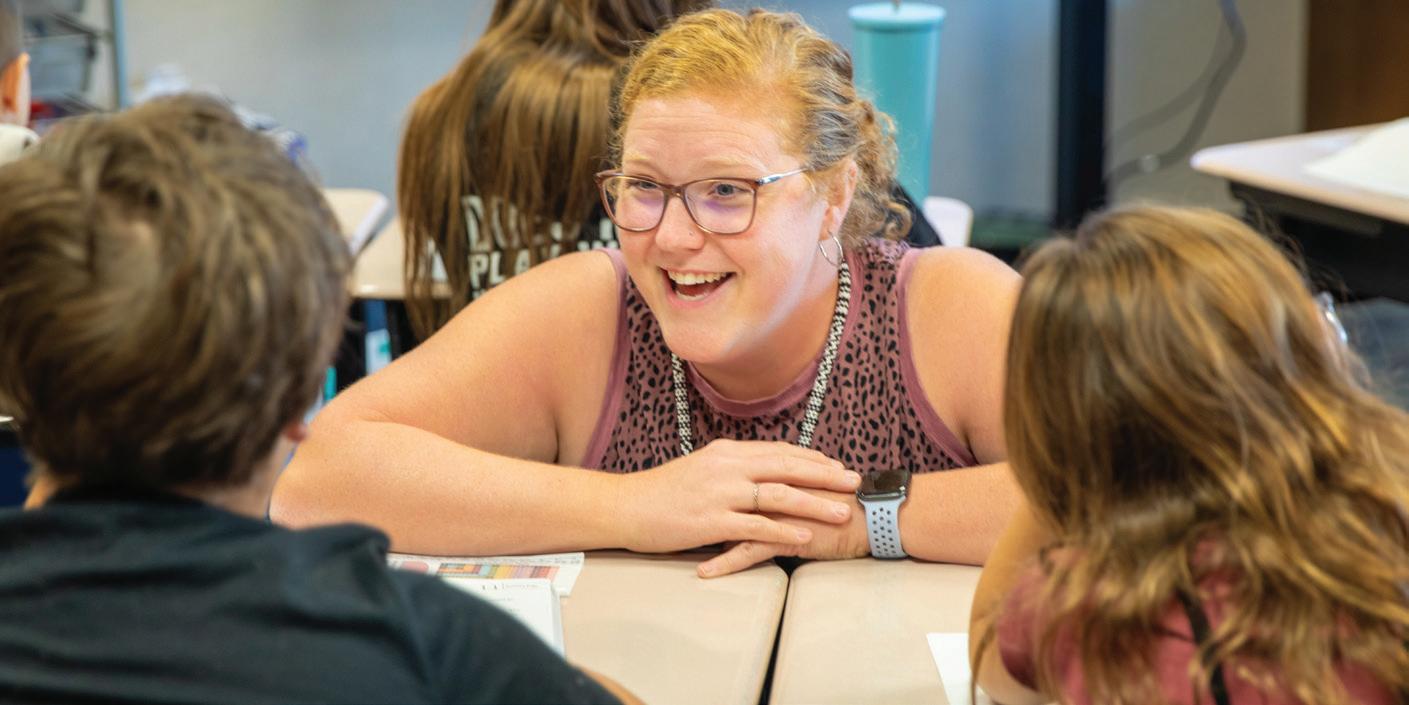
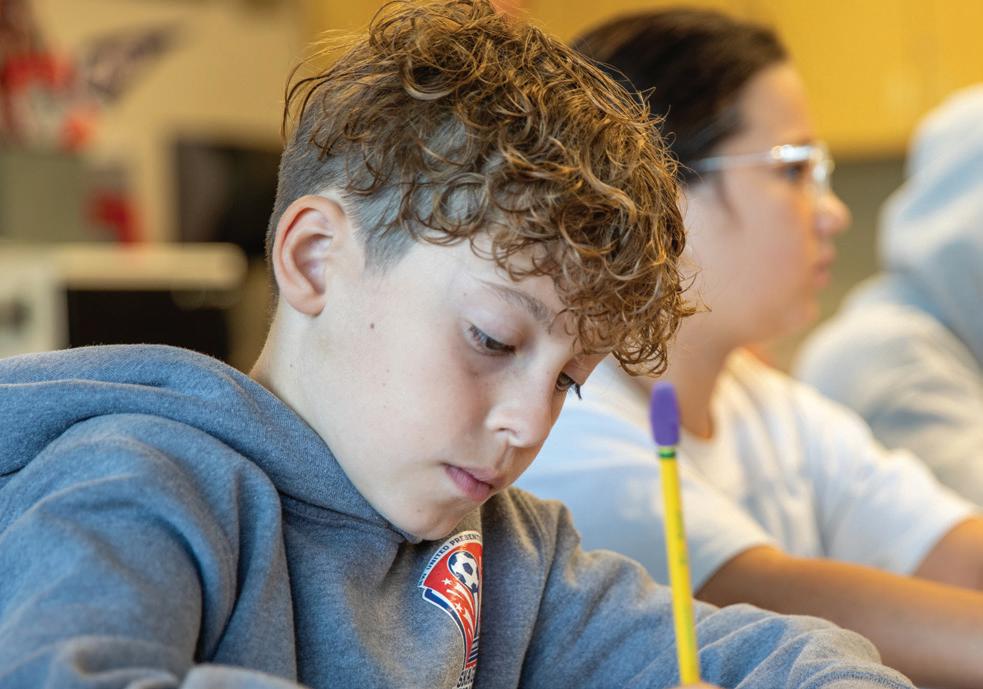

What does it take to build schools where kids feel safe, supported, and ready to learn? In Bethel, one of the key components is strong behavior systems. With that in mind, this summer we hosted nationally recognized experts Jessica and John Hannigan to help us make those systems even stronger.
The Hannigans have been working closely with Bethel for some time, helping our schools design and strengthen social-emotional and behavioral systems that put students first. This summer, they once again met with school and department behavior teams for a full day of collaboration and training.
“Bethel is one of our model districts. You’ve already done so much. What we love the most about Bethel’s process is, number one, the coherence,” Jessica Hannigan said.
Her husband and co-presenter, John, emphasized that the work goes beyond academics.
“We’re here to create empathic
members of our communities. It’s not just a focus on academics – while that’s very important – but we also want to create good humans, good people," he said.
At the heart of this effort are the school behavior teams themselves, made up of educators, staff, and administrators.
“Having a whole team there gives everyone a buy-in. It’s not just administrators telling us, but it gives the educators voices, too,” said Traci Overstreet, a teacher, union leader, and behavior team member.

District leaders also point to collaboration as the key to progress.
“This has been a journey, and there’s been a ton of learning along the way. But the thing that stands out
most to me is the simple fact that this is not just the teachers’ work or just the administrators’ work – this is our work,” said Kelly Boynton, our Executive Director of Elementary Schools.
Over the past year, Jessica Hannigan has observed Behavior Teams throughout the district, offering feedback and answering questions. She has also visited classrooms to see these systems in action and speak directly with teachers and students about their experiences.
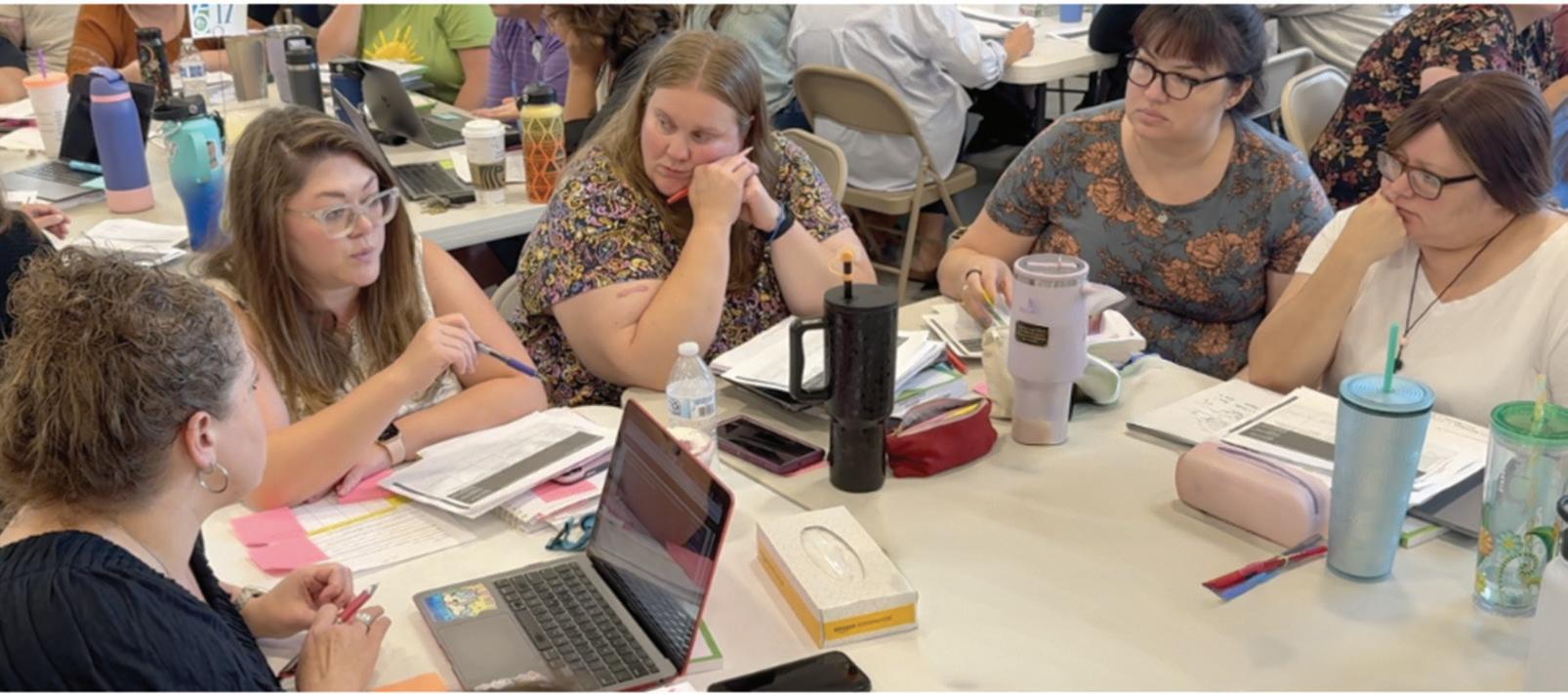
As the partnership grows, the focus remains clear: creating the best possible learning environment for students. By investing in the growth of educators and building coherent systems, Bethel is ensuring that when staff learn and grow, students benefit most of all.

Every school day in Bethel begins with a simple guarantee: no child will go hungry.
And this year, thanks to the hard work of our Child Nutrition staff, every student in the district qualifies for free breakfast and lunch. That's tens of thousands of meals prepared and served for free across the district.
For Director of Child Nutrition
meal -- it’s a foundation for learning.
“A lot of our kids come from families who struggle with food security and not being able to put enough food on the table,” Beha said. “I want to make sure they’re set up for success in class, and a hungry child is not going to be able to pay attention or reap the benefits of everything our educational system and our teachers are presenting to them each day.”
Washington’s Child Nutrition Eligibility and Education Benefit (CNEEB) form is used for much more than free meals. It also helps fund schools and connects families to income-based benefits. Completing the form ensures Bethel can continue offering universal free meals and access other vital resources. All Bethel families should fill it out online at Bethelsd.org/meals or scan the QR code below.
“We are really the biggest restaurant in Pierce County. We have 31 locations. So if you think of a franchise, we have 31 schools where we are preparing and serving meals.”
-Leeda Beha, Director, Child Nutrition Services
Leeda Beha, the work is also deeply personal.
“For me, personally, it’s always been a mission that when I think about feeding our students, I think about feeding my own kids,” she said.
Children can’t focus on fractions, spelling, or science when they’re hungry. Research shows that students who are chronically hungry tend to earn poorer grades, lower test scores, and have worse graduation outcomes. That’s why nutrition is more than a

Behind the scenes, our Central Kitchen runs like a massive restaurant. During the pandemic, staff served more than three million meals, which is far more than in a typical school year.
“We are really the biggest restaurant in Pierce County,” Beha said. “We have 31 locations. So if you think of a franchise, we have 31 schools where we are preparing and serving meals.”
Even though meals are free for all, families still play a big role in keeping the program sustainable.


Maybe your kid wants to be a mechanic. Maybe a nurse. Maybe they want to start their own business, join the Army, or become an electrician. No matter what path they choose, they’re going to need skills, training, and experience.
That starts in high school … but it doesn’t end there.
Here in Bethel, we’re proud that more than 90% of our students earn a high school diploma. That’s a big deal.
But here’s the hard truth: just graduating from high school isn’t enough anymore. Many students finish high school, but don’t take the next step – whether that’s learning a trade, going to college, joining the military, or starting an apprenticeship. And that’s where the real challenge starts.
Superintendent Brian Lowney said less than 50% of our high school graduates go on to some form of education after they cross the graduation stage.
“Every bit of research shows that our students have to have some kind of post-secondary training, education,
and/or certification in order to earn family level wages to support the kinds of life that they want to have,” he said.
But Lowney said that doesn’t mean every student has to go to college. But the skills needed are similar.
“The skills that it takes to get into a university and be successful, are often the same skills it takes in moving up the ranks in the military, to be successful in an apprenticeship, or to be successful in a career,” he said. Lowney believes every student in Bethel should graduate having already earned at least one college credit.
“One of the things my grandpa used to say to me is, ‘The best indicator of future success is past success,’” he said.
Basically, “if you’ve done it before, you can do it again.” It builds confidence, and confidence is everything.
That means the skills you build in high school matter now, more than ever. Thankfully, here in Bethel, students have more chances than ever to get a head start.
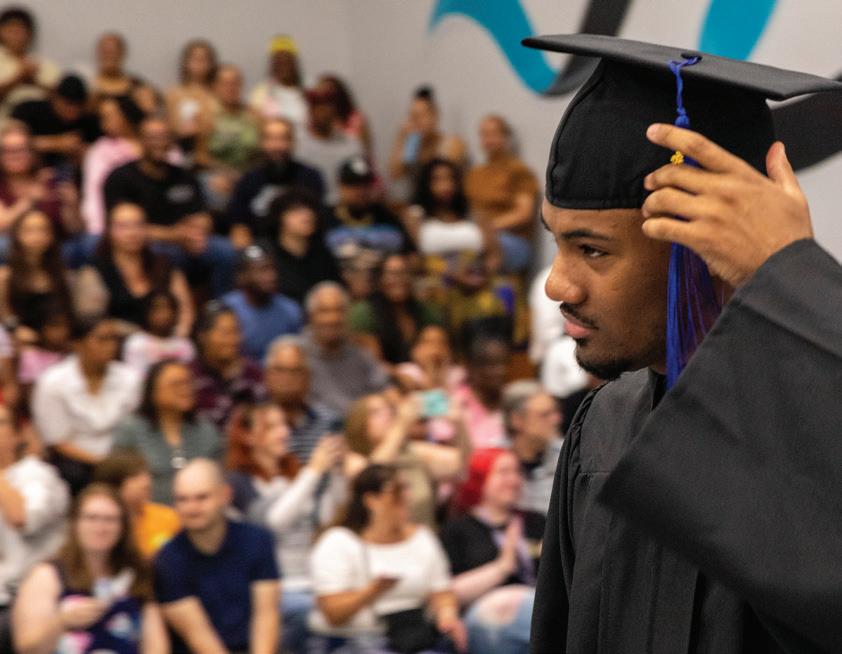
Pierce County Skills Center offers hands-on learning
Hands-on programs at the Pierce County Skills Center allow students to learn real-world skills in areas like construction, medical careers, firefighting, and more. They earn high school credit, and in many cases, college credit or industry certifications too.
With Running Start, students can take classes at Pierce College as part of their high school coursework. Some students even earn their Associate’s Degree by the time they get their high school diploma. That saves families thousands of dollars and gives students a head start on life.
Another option is College in the High School. It lets students earn college credit right in their own high school classrooms. Thanks to partnerships with Central Washington University, the University of Washington, and Eastern Washington University, students can start earning credit as early as 9th grade.
And for families thinking college might be out of reach? Bethel has teamed up with UW Tacoma for a program called Pathways to Promise. If a student keeps their grades up and takes the right classes, they’re guaranteed admission to UW Tacoma.
At the end of the day, it’s all about giving students the tools they need to build a future they want.
Because high school isn’t just about getting a diploma.
It’s about preparing for what comes next.
Contact your student's high school to learn more about the opportunities available to them.

For nearly 35 years, the readerboard at Graham Elementary School has displayed information about countless upcoming events, along with school and community news. What you may not know is that the piece of land the readerboard stands on belonged all along to Dolores Jarvis, a longtime community member and steadfast supporter of the Bethel School District. For more than three decades, she allowed us to use the land for the readerboard, free of charge.
Recently, in a deeply generous gesture, Mrs. Jarvis approached the District with an offer: to donate this one-acre property, located directly next to Graham Elementary, to the district.
The readerboard has been a familiar sight to generations of students, parents, and community members. School Board President Terrance Mayers, Sr. said it was one of the first things he saw when his family moved to the community.
“That was my introduction to the Bethel School District,” he said. “That was the first school sign that I saw
when I was looking for a home in this area.”
This gift isn’t just about land. It’s about legacy, community, and preparing for the future. The Bethel School District Board of Directors officially accepted the donation, recognizing the strategic and heartfelt value of the property. Beyond continuing to house the school’s readerboard, the land opens the door for future projects that could enhance the school’s facilities and infrastructure — possibilities that would benefit students for years to come.
“What an amazing gift,” said Board Member Roseanna Camacho. “Your legacy will live on through this piece of property and we will be forever grateful.”
This donation reflects the kind of quiet generosity that strengthens our community and enriches the lives of our students. It’s a reminder that supporting education can take many forms, and we are thankful to the Jarvis family for believing in our district and supporting our students through this donation.
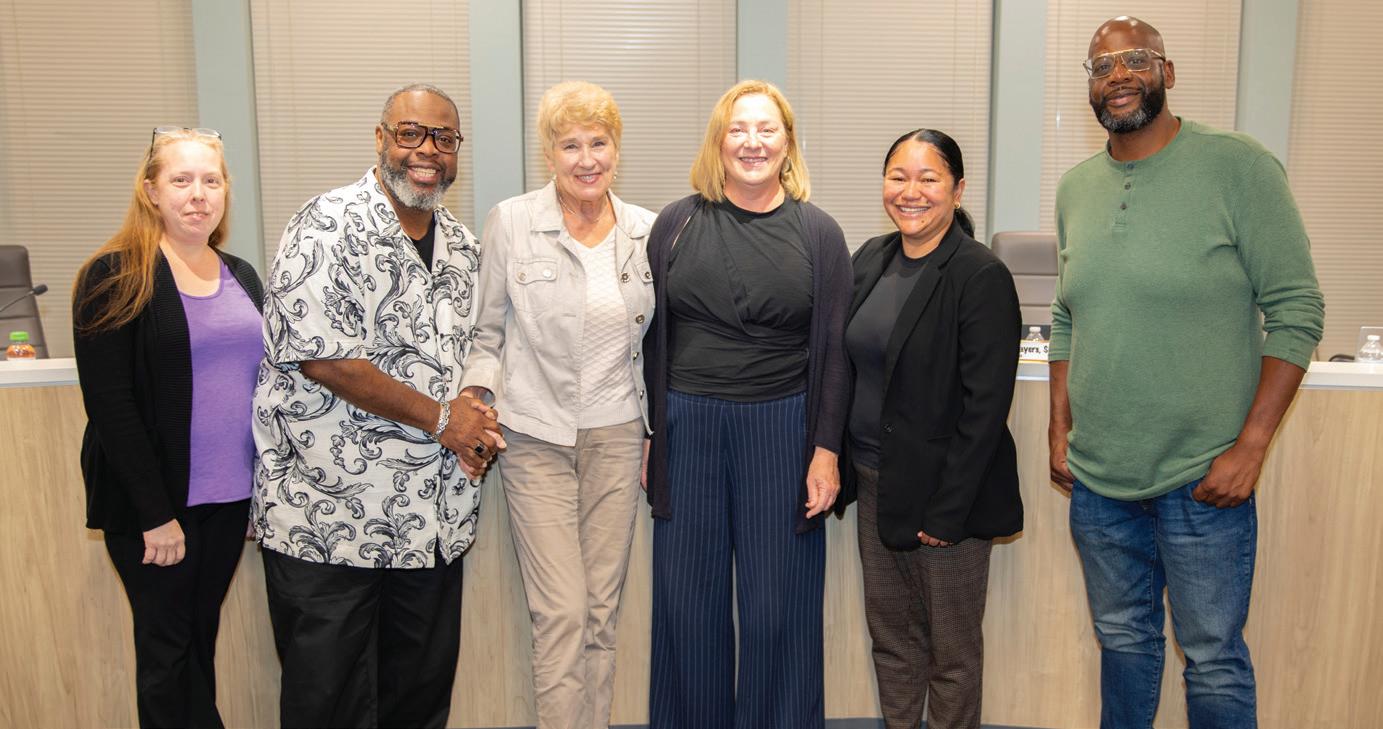
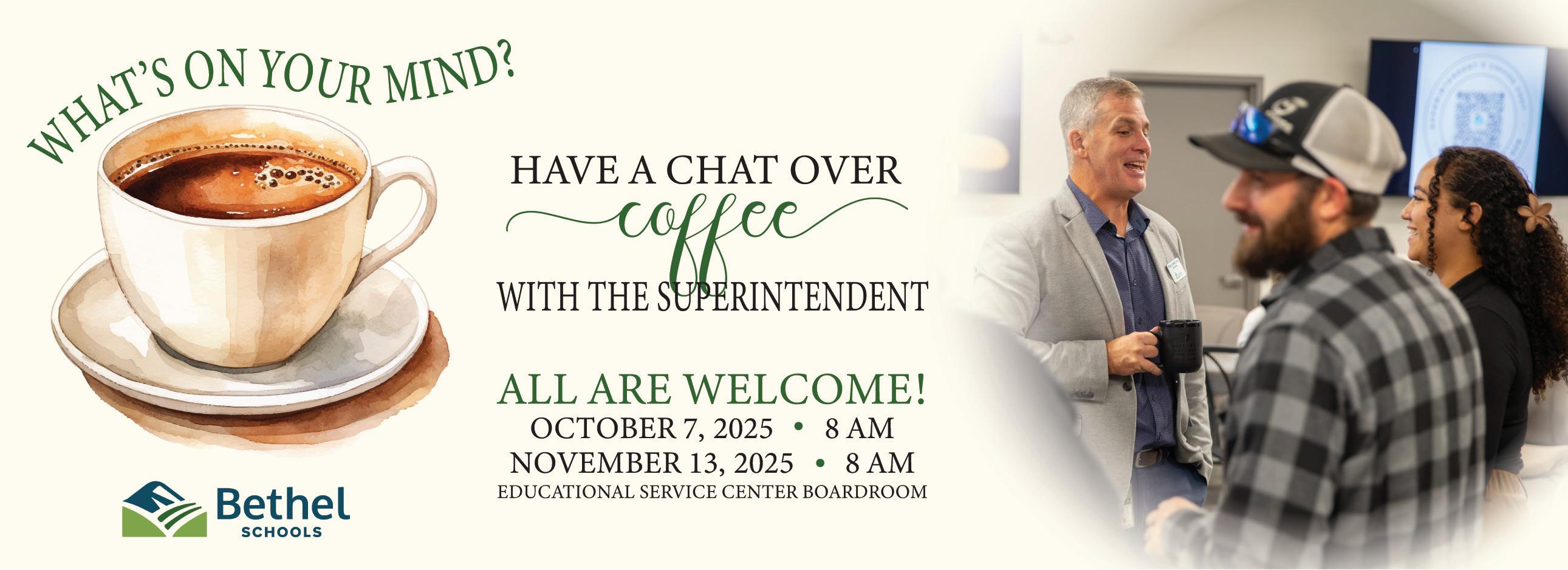

Bethel Pride is produced by the Bethel School District’s Communications Department.
Bethel Schools
516 176th Street East, Spanaway, WA 98387
Phone: 253.800.2000
Email: communications@bethelsd.org Website: bethelsd.org
TheBethelPrideisintendedtoinformthecommunityatlargeaboutgoingsoninthedistrict.Because weusebulkmailing,individualaddressescannotberemovedfromthemailinglist.
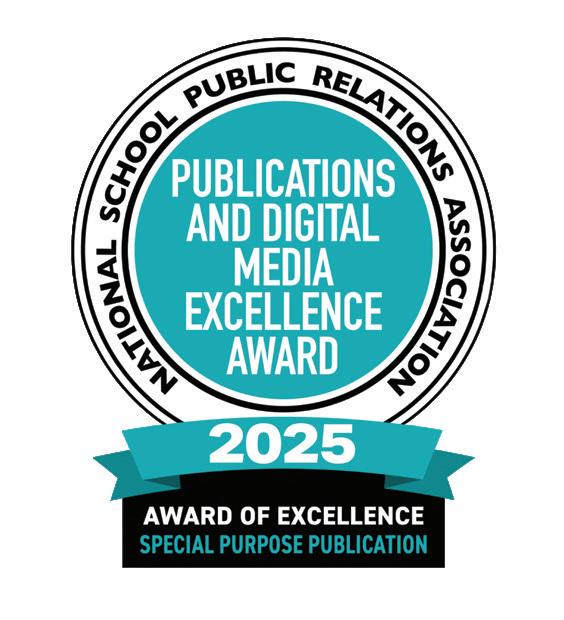
Bethel School District does not discriminate in any programs or activities on the basis of sex, race, ethnicity, color, religion, creed, national origin, sexual orientation, gender identity, gender expression, homelessness, immigration or citizenship status, disability, neurodivergence, the use of a trained dog guide or service animal, age, and honorably discharged veteran or military status and provides equal access to the Boy Scouts and other designated youth groups. The following employees have been designated to handle questions and complaints of alleged discrimination: Civil Rights Compliance / Gender-Inclusive Schools Coordinator, Debbie Carlman, dcarlman@bethelsd.org, 253.800.2019; Title IX Coordinator, Mel Boyd, mboyd@bethelsd.org, 253.800.2029; and 504 Coordinator, Melissa Munson-Merritt, mmunsonmer@bethelsd. org, 253.800.2301. All individuals may be reached at this address: 516 176th Street East, Spanaway, WA 98387. Title IX inquiries may also be directed toward the U.S. Department of Education, Office for Civil Rights (OCR). Information about the nondiscrimination and sex-based discrimination policies and grievance procedures, and how to report a concern or complaint: bethelsd.org.
El Distrito Escolar de Bethel no discrimina en sus programas ni actividades por motivos de sexo, raza, etnia, color, religión, credo, nacionalidad, orientación sexual, expresión o identidad de género, falta de hogar, estatus migratorio o de ciudadanía, discapacidad, neurodiversidad, uso de perro guía entrenado o animal de servicio, edad, condición de veterano o militar con baja honorable. Asimismo, ofrece igualdad de acceso a los Boy Scouts y a otros grupos juveniles especificados. Los siguientes empleados han sido designados para atender consultas y quejas de supuesta discriminación: Cumplimiento de los Derechos Civiles/ Coordinadora Escolar de Inclusión de Género, Debbie Carlman, dcarlman@bethelsd.org, 253.800.2019; Coordinador del Título IX, Mel Boyd, mboyd@bethelsd.org, 253.800.2029; y Coordinadora 504, Melissa Munson-Merritt, mmunsonmer@bethelsd.org, 253.800.2301. Todas las personas pueden ser localizadas en esta dirección 516 176th Street East, Spanaway, WA 98387. Las consultas sobre el Título IX también pueden dirigirse a la Oficina de Derechos Civiles (OCR) del Departamento de Educación de los Estados Unidos. Para más información sobre las políticas de no discriminación y discriminación por razón de sexo, los procedimientos de reclamación, y sobre cómo comunicar una preocupación o queja visite: www.bethelsd.org

Bethel School District No. 403 516 176th St. E., Spanaway, WA 98387-8335
(253) 800-2000 | www.bethelsd.org
